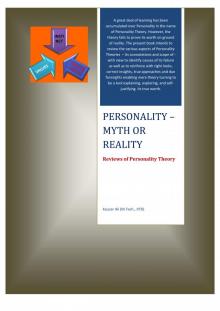


PERSONALITY - REALITY OR MYTH
Kausar Ali

There are various definitions of Personality all focusing on behavior of an individual unique and distinguishable in a given contexts or situations.
“An individual’s personality, then, is his unique pattern of traits.”
Definitions: J.P. Guilford (1959)
A trait is “any distinguishable, relatively enduring way in which one individual differs from others.”
Definitions: Mackinnon (1959)
The sum total of typical ways of acting, thinking, and feeling that makes a person unique.
Definitions: DSM-IV-TR (2000)
“Are enduring patterns of perceiving, relating to, and thinking about the environment and oneself that are exhibited in a wide range of social and personal context.
Definitions: R.B. Cattell (1950)
The behavior is presumed to be influenced by factors denoted by “TRAITS” [Refer Holland’s Personality Types]. Thus Personality begins and ends at behavioural pattern involuntarily defined by TRAITS of an individual rather than Conscious Mode of Mature response per se.
The traits as expressed involuntarily are diverse and complex [Denoted by distinct Personality Types]. It is commonly referred as Personality Theory of Holland encrypted as RIASEC theory of Personality.Though, they exhibit differences they are utility attributes and ingredients much essential for varieties of activities man do perform. The profile of a person assigned for “Fire-fighting work” must be different from profile contents of a “Researcher” else we may end at disastrous consequences. Even working long with a profession may build relevant and indispensable traits compatible and conforming to very tasks/job profile.
The salient features of Personality defined by RIASEC Theory proposed by Holland may be summarized as under:
Factors Influencing Behaviour
However simple it might appear, the behavior of an individual is a complex process governed by many factors – voluntary and involuntary.
The behavior of an individual is a function of following by 3 variables
1.Physiological Needs of a Biological Man
2.Psycho-analytical configuration based on Traits and Skills
3.Values as Attributes of Characters
BIOLOGICAL MAN - ANIMALHOOD
So long a man’s behavior is governed solely by physiological needs, sensual desires and similar elements of motivation, he/she is a Biological Man closely resembling animals driven by Instincts. These basic instincts are but features common to all living organisms. An Ideal liberalist not obeying any principle of values whatsoever rather than driven solely by instincts is a perfect example of a BIOLOGICAL ANTHROPOID.
PSYCHO-ANALYTICAL MAN - MANHOOD
Behaviour controlled by Psycho-analytical configuration includes elements of natural tendency leading to behavioural pattern specific and unique of its sorts. It includes attributes called TRAITS and SKILLS. If TRAITS are psychological aspect of unconscious behavior towards an event or circumstances, SKILLS are Contents and Composition of Intellectual inventories gained through various sources – family, elders, profession, peer group, society or similar contacts and communications. When behavior is dominated by attributes of TRAITS and SKILLS, the response is reflected as behavior enriched with Intelligence - Logical reasoning along with distinct personal attributes. His behavior thus differs significantly from the previous one. They help it to qualify to MANHOOD or PERSONAGE from BIOLOGICAL ANIMALHOOD of the previous category.
The component of Intellectual part is distinct, controllable, voluntary and conscious independent of TRAITS. It has the power and potential to modify the nature and effects of TRAITS one possesses. Thus a comprehensive behavior pattern cannot be defined without admitting the contribution of INTELLECT. Thus it would be appropriate to call such attribute base defining behavior as PSYCHO-ANALYTICAL. Though the Psycho-analytical configuration are varied and diverse, they are all Utility Attributes indispensable for societies growing in pursuance to highly sophisticated tasks with intricate complexities. The traits and skills of a teacher is bound to differ that that of a salesman.
This is in sharp contrast to contemporary definition of PERSONALITY extended by many management advocates. Most of the proponents of Personality Theory define Personality to be based and governed exclusively by unconscious, involuntary forces from within to the extent of neglecting the role and relevance of INTELLECT as an Independent, Conscious and agent Powerful enough to define and influence the behavior of an individual.
“The Unexamined life is not worth living.” - Socrates
VALUE-DRIVEN MAN - PERSONALITY
It is man behaving with conscious adoption of values in all adult mood of communication and interaction. It is the sense of responsibility that turns him into Personality. The higher the values in merit, contents and the more honestly appreciated by its upholder, the better the Personality Profile defined, carved and illustrated through. A sustained all time assured behavioral response with VALUES as deriving force acting undeterred; is the characteristic elements of distinctions of mature, vivid and illustrative Profile of Personality.
“Try not to become a man of success but rather try to become a man of value.” – Albert Einstein














